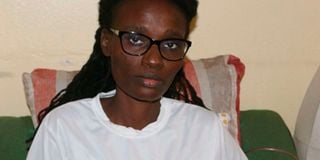Joy's stiff chest makes her voiceless

What you need to know:
- According to Dr Silvanus Wabwire, a consultant neurologist based at the Kenyatta National Hospital, stiff person syndrome is characterised by progressive stiffness and muscle spasms affecting the trunk and limb muscles.
- “The disease has an estimated prevalence of one to two cases per million, with an incidence of one case per million per year. No clear local data is available but local neurologists have a couple of patients.”
Joy Lwangu suffers from stiff person syndrome (SPS), a rare neurological condition that causes muscle stiffness and spasms that can lead to breakage of bones, causing chronic debilitating pain.
Currently, her speech, walking and daily activities are severely affected. “Due to chest/trunk stiffness, my vocal muscles also have spasms and I am mostly voiceless. If you can hear me when I can talk, it is really in a low pitch and even if I manage to do so, it is a serious struggle to get the words out due to chest stiffness and pain,” explains the 37 year old.
“Sleeping does not come automatically for me. I have to take very strong painkillers to sleep. And even so, I keep waking up every two hours because of the pain,” she says.
Apart from that, Joy is hypersensitive — eyes, ears and skin. “I have prescription polarised glasses for light, sound-blocking headphones, and I have to look for clothes and sheets that will not irritate my skin.”
For her, normalcy is a distant dream, making her dependent on a caregiver to assist with her daily chores. She communicates mainly by texting and emailing.
Joy has been under regular treatment with different doctors and specialists since 2011, but this was for different symptoms.
“After a spike in symptoms between 2015 and 2016, the neurosurgeon I was seeing put all symptoms as indicating one condition. They found a cyst in my spinal cord but agreed it was only causing 20 per cent of the problems I was enduring. I was referred to a neurologist for further investigation.”
In 2019, she was diagnosed with SPS. She started experiencing excess pain and complications in her gastrointestinal tract and mobility, which could sometimes affect her stability.
She notes that in early 2021, oral medication and weekly emergency visits to control symptoms were not working at all, thus the intravenous immunoglobulin (simply known as IVig) treatment was prescribed.
She was later on reviewed and told she would need monthly infusions to stop the progression of the disease alongside the oral medication regiment that she says can cost between Sh18,000 and Sh25,000 per month.
According to Dr Silvanus Wabwire, a consultant neurologist based at the Kenyatta National Hospital, SPS is characterised by progressive stiffness and muscle spasms affecting the trunk and limb muscles.
“SPS has an estimated prevalence of one to two cases per million, with an incidence of one case per million per year. No clear local data is available but local neurologists have a couple of patients.”
He says most patients present between the ages of 20 and 50. Classical SPS affects women two to three times more often than men. “A small percentage of SPS is associated with cancer that might not have been discovered yet,” he adds.
“Therapy is aimed at symptomatic relief and modulation of the autoimmune process. A group of drugs referred to as benzodiazepines, for example diazepam, are usually effective for rigidity and muscle spasms.”
According to Dr Wabwire, immunotherapy should be considered in most patients with SPS. “IVIg can achieve a marked improvement in muscle spasms, mobility and frequency of falls and activities of daily living. The benefit lasts between six weeks and one year.”
Unfortunately, he adds, IVIg is quite expensive and is given based on weight. “An average weight patient would require IVIg dose that cost an average of Sh1 million per dose,” notes Dr Wabwire.





